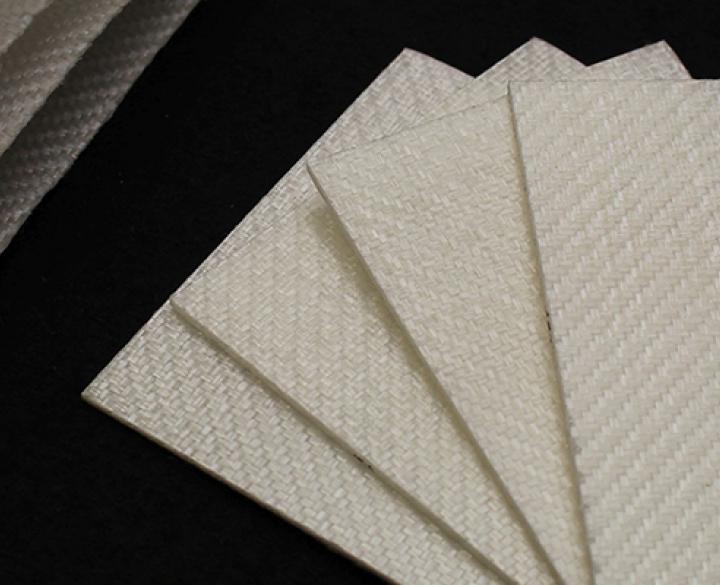The BIO4SELF project is selected as one of finalists for the 2019 Global Bioplastics Award issued by international trade publication bioplastics MAGAZINE. Known as the "Bioplastics Oskar", the award will be presented this year for the 14th time in succession.
If BIO4SELF wins again, it will be the third innovation award in a row, after the JEC Innovation award 2019 and the Techtextil 2019 Innovation Award!
The finalists were selected by a panel of five judges hailing from the academic world, the press and industry associations from America, Europa and Asia. The winner will be revealed on December 3rd, 2019 during the 14 European Bioplastics Conference in Berlin, Germany. The 14th Bioplastics Award recognises innovation, success and achievements by manufacturers, processors, brand owners, or users of bioplastic materials. To be eligible for consideration in the awards scheme the proposed company, product, or service must have been developed or have been on the market during 2018 or 2019.
The 5 shortlisted companies/products are (in no particular order):
Carbiolice (France)
The company has developed an enzymatic masterbatch to make PLA home compostablea. The Evanesto additive is added in a concentration of less than 5% to a compound with a high content of PLA during conventional converting processes such as film extrusion, thermoforming, injection moulding. Initial tests carried out by independent laboratory OWS on thin films comprised of 30% PLA and 5% Evanesto, with the rest made up of other biodegradable and biobased polyesters, such as biobased PBAT, TPS, etc., have shown that complete disintegration is achieved within a time frame of 182 days (6 months) under home composting conditions. Tests on thicker films obtained by calendering and thermoforming are still ongoing, but the initial results are very positive.
Bio4self
The entry from this EU consortium of 15 partners consists of new industrial-scale self-reinforced PLA composite materials, developed within the scope of the Bio4self project funded by European Research Fund H2020. In the project, two different PLA types with different melting temperatures are combined to yield a self-reinforced PLA composite (PLA SRPC) in which the PLA with the higher melting temperature is embedded as a reinforcing fibre in the lower melting matrix. The resulting material stiffness can compete with commercially available self-reinforced polypropylene (PP) composites. This makes it possible to produce mechanically demanding components for the automotive and electrical household appliance sectors, among others.
Although the composite materials developed have been functionalised for high mechanical strength and stiffness as well as for high temperature and hydrolysis stability, like pure PLA they are completely biobased, easily recyclable, formable and even industrially biodegradable.
As an example, the application in a car seat structure was demonstrated at the JEC Composite trade show in March 2019. During the show, this project was awarded a JEC Innovation Award for sustainability, announced at the JEC Innovation Award ceremony on March 12, 2019.
Kartell (Italy)
Kartell (Noviglio, Milan, Italy) is offering a new eco-friendly and sustainable edition of one of its best sellers - a modular storage unit in the 100 % natural bioplastic material by Bio-on (Bologna, Italy). The Componibili storage unit, which is cylindrical in form with sliding panels, was first created by Italian designer and Kartell co-founder Anna Castelli Ferrieri in 1967. The 50-year old design is available in four colours: green, pink, creama and yellow in the three-module version.
Originally made from ABS plastic in the 1960s, the updated bioplastic unit is made from Bio-on’s PHB Material, made from agricultural waste.
For Kartell, research is a mission, said company president Claudio Luti. “We will continue to experiment to combine innovation and design.”
Dantoy (Denmark)
In February 2018, Dantoy, a manufacturer of quality toys in Denmark for more than 50 years, launched its new line of BIO products, which has generated far more attention than initially anticipated. Today, more than 15% of all dantoy’s products are made from Braskem’s Green PE™, supplied by FKuR, a development clearly contributing to this toy company’s healthy sales figures. All of Dantoy’s Plastic toys are licensed for the Nordic Swan Ecolabel, thus they must comply with the world’s strictest requirements for plastic contents, going far beyond the Danish law. In addition to using biobased plastic raw materials for the bio and the brand new Tiny lines, dantoy tries to minimise the impact of its operations on the environment. The company has therefore implemented eco-friendly processes to manage the consumption of energy, water and raw materials and to prevent the possibility of accidental releases or emissions via the manufacturing process.
Nölle Kunststofftechnik and Fraunhofer IAP (Germany)
A novel splint made of PLA for immobilizing bone fractures has been developed by Nölle Kunststofftechnik. The new immobilisation concept, called RECAST makes use of variously sized preshaped splints made from biobased and biodegradable PLA. The low thermal softening point of PLA 58 °C offers the advantage that the product can be shaped repeatedly and quickly by heating. The splints are heated to between 55 and 65 °C. The temperature of the splints is then reduced to a minimum. The now formable aplastic is moulded to fit the corresponding part of the body. This process takes about five minutes. If adjustments are required, e.g. after the initial swelling subsies, the hardened splint can simply be reheated. The plastics processor worked closely with the polymer developers at the Fraunhofer IAP in Potsdam-Golm on the development of the optimum material. The Fraunhofer researchers combined PLA with suitable fillers and developed a formulation that met all the requirements. In addition, they ensured that the material could also be produced in industry-relevant quantities.
In order to make the splint even more comfortable for patients, RECAST products also feature a fleece padding made of PLA and viscose, which was developed jointly with the Saxon Textile Research Institute in Chemnitz.




